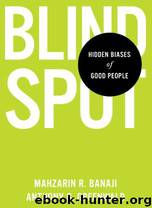Blindspot: Hidden Biases of Good People by Mahzarin R. Banaji & Anthony G. Greenwald Mahzarin R. Banaji

Author:Mahzarin R. Banaji & Anthony G. Greenwald, Mahzarin R. Banaji [Banaji, Mahzarin R. & Anthony G. Greenwald, Mahzarin R. Banaji]
Language: eng
Format: epub
Tags: Sociology, Self-Help
ISBN: 9780553804645
Publisher: Delacorte Press
Published: 2013-02-05T00:00:00+00:00
Young Children
At different points in development, a child comes to know that she is, for example, female, Irish, middle-class, brown-eyed, and athletic. One of our colleagues noticed early in childhood that any mention that she had eight siblings always elicited the same question from acquaintances: “Are you Catholic?” She cites this experience as a precursor to her interest in intergroup matters.10 Those who have easily recognizable regional accents doubtless will have had many “Are you from ______?” experiences of this type. Some group identities develop only gradually and are freely chosen. For example, identifying yourself as athlete or scholar may happen only after multiple experiences over time have made it clear that this is a group you belong in because the activity that is the basis for the group’s shared identity is something you’re really good at. Other divisions into “us” and “them” may emerge quite abruptly, and without any choice in the matter. An African American colleague recalls that when she was a toddler another child asked if she could lick her because she was so obviously made out of chocolate. Her instant discovery of the difference between herself and the other child came as a true revelation.
Surface differences—the star on the belly, the color of the skin, the sound of the voice—spur the beginnings of the ability to recognize similarity and difference. But once language comes into play, the sheer force of words can rapidly “stamp in” the meaning of group identities.
The use of language to establish identity was nicely demonstrated in a recent study led by Andy Baron at Harvard University. In his study, three- to five-year-olds were shown pictures of two groups of cartoon characters, one colored purple, the other red. One group did rotten things such as break toys and cause car crashes, while the other did nice things such as help others. If the children merely saw these differently colored and differently behaving characters, they didn’t seem to assign them a group identity. But if they were given names for the two groups (“These are the Nifs,” “These are the Lups”) they quickly figured out who were the good guys and who were the bad guys. In other words, at that age, the differences in the appearance of the two sets of characters (purple versus red) were not automatically seen as cues to group membership. But once the groups had names, the children became aware of the differences between them and understood that they belonged in different categories.11 This is the beginning of stereotyping.
Gender is a strong basis for identifying oneself as a member of a group, male and female being among the earliest social category distinctions that children make.12 In one recent study, three-year-old boys and girls were seated, one by one, in front of a video monitor and shown the faces of a boy and a girl, each paired with a novel object they had never seen. The boy in the video said: “My name is Ben. I like spoodles. Spoodles are my favorite thing to eat!” The girl in the video said: “My name is Betsy.
Download
This site does not store any files on its server. We only index and link to content provided by other sites. Please contact the content providers to delete copyright contents if any and email us, we'll remove relevant links or contents immediately.
Rewire Your Anxious Brain by Catherine M. Pittman(18644)
Talking to Strangers by Malcolm Gladwell(13350)
The Art of Thinking Clearly by Rolf Dobelli(10457)
Mindhunter: Inside the FBI's Elite Serial Crime Unit by John E. Douglas & Mark Olshaker(9324)
Becoming Supernatural by Dr. Joe Dispenza(8204)
Change Your Questions, Change Your Life by Marilee Adams(7762)
Nudge - Improving Decisions about Health, Wealth, and Happiness by Thaler Sunstein(7694)
The Road Less Traveled by M. Scott Peck(7594)
The Lost Art of Listening by Michael P. Nichols(7494)
Mastermind: How to Think Like Sherlock Holmes by Maria Konnikova(7324)
Enlightenment Now: The Case for Reason, Science, Humanism, and Progress by Steven Pinker(7306)
Win Bigly by Scott Adams(7184)
The Way of Zen by Alan W. Watts(6604)
Daring Greatly by Brene Brown(6504)
Big Magic: Creative Living Beyond Fear by Elizabeth Gilbert(5756)
Grit by Angela Duckworth(5605)
Ego Is the Enemy by Ryan Holiday(5417)
Men In Love by Nancy Friday(5234)
The Laws of Human Nature by Robert Greene(5179)
